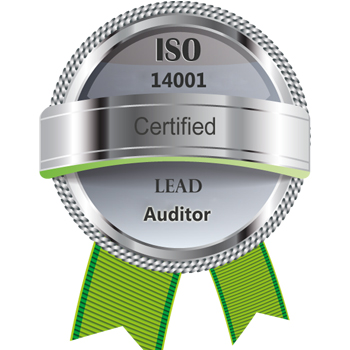As organizations become increasingly aware of their environmental responsibilities, the demand for effective Environmental Management Systems (EMS) grows. One of the most widely recognized standards for managing environmental impact is ISO 14001, which provides a structured approach to reducing an organization’s environmental footprint and ensuring compliance with regulations.
The role of a Lead Auditor is crucial in assessing the effectiveness of an ISO 14001 EMS, ensuring it meets the requirements of the standard and supports continuous improvement. This article explores the significance of ISO 14001 Lead Auditor Training, the skills and knowledge it provides, and how it empowers professionals to lead audits that drive environmental sustainability.
What is ISO 14001 Lead Auditor Training?
ISO 14001 Lead Auditor Training is a specialized course designed for professionals who will lead audits of their organization’s Environmental Management System (EMS). This training equips individuals with the tools and techniques necessary to perform independent, thorough audits, ensuring that the EMS is operating effectively and in alignment with ISO 14001 standards. Lead auditors are responsible for managing the audit process, evaluating the EMS, identifying non-conformities, and providing recommendations for improvement.
This course is ideal for experienced auditors or professionals with a background in environmental management who want to develop their skills to lead EMS audits and contribute to the continuous improvement of environmental performance within their organization.
Why is ISO 14001 Lead Auditor Training Important?
An ISO 14001 Lead Auditor plays a pivotal role in assessing the performance of an EMS, ensuring compliance with environmental laws, and supporting the organization in its sustainability goals. The importance of ISO 14001 Lead Auditor Training extends beyond just auditing skills—it also involves leadership, strategic thinking, and a deep understanding of environmental standards. Here are some key reasons why this training is vital:
- Ensuring Compliance with Legal and Regulatory Requirements
ISO 14001 helps organizations manage their environmental responsibilities and comply with environmental regulations. A lead auditor ensures that the EMS is fully aligned with legal requirements and industry standards. The training prepares auditors to identify any gaps in compliance, preventing the organization from facing legal penalties and potential reputational damage. - Driving Environmental Performance and Risk Mitigation
Lead auditors help organizations identify areas where their environmental management systems can be improved. This includes identifying risks, assessing their severity, and recommending mitigation strategies. ISO 14001 Lead Auditor Training provides the expertise needed to evaluate the EMS’s effectiveness and suggest practical improvements that reduce environmental risks and enhance sustainability efforts. - Facilitating Continuous Improvement
ISO 14001 promotes a continuous improvement cycle, which is crucial for ensuring that environmental performance keeps improving over time. Lead auditors are responsible for monitoring the effectiveness of corrective actions, ensuring they are properly implemented, and verifying that the EMS remains aligned with evolving environmental goals and regulations. This focus on continuous improvement helps organizations stay ahead of potential environmental challenges. - Building Organizational Reputation
By ensuring that the organization adheres to ISO 14001, lead auditors contribute to improving the company’s reputation as a responsible and sustainable entity. In today’s market, consumers, investors, and stakeholders are increasingly prioritizing sustainability. ISO 14001 certification demonstrates a commitment to environmental protection, boosting the organization’s credibility and competitive edge. - Providing Leadership and Guidance
As a lead auditor, you are responsible for managing the audit team and ensuring that audits are performed effectively. This requires not only technical expertise but also leadership and communication skills. ISO 14001 Lead Auditor Training helps participants develop these skills, enabling them to manage audit teams, engage with senior management, and drive improvements across the organization.
Key Benefits of ISO 14001 Lead Auditor Training
- Comprehensive Knowledge of ISO 14001
ISO 14001 Lead Auditor Training offers participants a deep understanding of the ISO 14001 standard, including the clauses, principles, and processes involved in managing an EMS. This in-depth knowledge allows auditors to evaluate an organization’s EMS against the standard’s requirements and assess its effectiveness. - Advanced Auditing Techniques
Lead auditors must be skilled in a range of auditing techniques to ensure that they conduct thorough and objective audits. Training in ISO 14001 Lead Auditor courses covers how to prepare for audits, gather evidence, evaluate compliance, and report audit findings effectively. Participants learn how to conduct interviews, assess data, and examine processes to determine if the EMS is functioning properly. - Risk Assessment and Mitigation Skills
One of the key responsibilities of a lead auditor is to identify and assess environmental risks within the EMS. This training teaches participants how to identify environmental risks, assess their potential impact, and recommend mitigation strategies that align with ISO 14001 requirements. It also helps lead auditors evaluate the effectiveness of risk mitigation actions already in place. - Leadership and Team Management
Lead auditors must be capable of leading audit teams, ensuring effective communication with stakeholders, and managing the audit process. The training helps develop leadership skills that allow auditors to handle complex audits, engage senior management, and resolve any challenges during the audit process. Participants also learn how to provide clear, actionable recommendations for improving the EMS. - Enhanced Reporting and Communication Skills
After an audit, lead auditors must report their findings clearly and persuasively. This training provides participants with the skills necessary to write audit reports that are accurate, concise, and easy to understand. The course also focuses on how to present findings to senior management, highlight non-conformities, and recommend corrective actions to improve environmental performance. - Career Advancement Opportunities
Completing ISO 14001 Lead Auditor Training opens doors to advanced career opportunities. As more organizations seek to align with environmental standards and demonstrate their commitment to sustainability, there is growing demand for qualified auditors. This certification helps professionals advance their careers and take on leadership roles in environmental management.
What Does the ISO 14001 Lead Auditor Course Cover?
The ISO 14001 Lead Auditor Course is comprehensive and typically covers the following key areas:
- Overview of ISO 14001 and Environmental Management Systems (EMS)
The course begins with an introduction to ISO 14001, its clauses, and the principles behind an EMS. Participants learn how the standard aligns with environmental laws and regulations and how it helps organizations manage their environmental impact. - Planning and Preparing for an Audit
Participants learn how to plan for an effective audit, including defining the audit scope, determining audit objectives, selecting audit teams, and preparing audit checklists. Proper planning is critical for ensuring the audit process is efficient and effective. - Conducting the Audit
This section of the course covers how to conduct an audit in line with ISO 14001 requirements. This includes collecting evidence, conducting interviews, reviewing documentation, and evaluating the organization’s EMS processes to identify non-conformities and areas for improvement. - Identifying Non-Conformities and Root Cause Analysis
Lead auditors are trained to identify non-conformities and determine their root causes. They learn how to categorize non-conformities based on severity and recommend corrective actions that address the underlying issues rather than just surface-level symptoms. - Reporting Audit Findings and Recommendations
After conducting an audit, the lead auditor must report their findings to management. Participants are trained on how to produce clear, actionable audit reports that outline audit results, highlight non-conformities, and provide recommendations for corrective actions. - Follow-Up and Verification of Corrective Actions
The course also covers how to follow up on corrective actions, ensuring that they are effectively implemented. Lead auditors verify the actions taken and evaluate their impact on improving the EMS. - Practical Case Studies and Simulations
To reinforce the knowledge gained, participants engage in practical case studies and audit simulations. These hands-on exercises help participants apply what they’ve learned to real-world situations, improving their confidence and competence as lead auditors.
Who Should Take ISO 14001 Lead Auditor Training?
ISO 14001 Lead Auditor Training is designed for professionals who are responsible for leading environmental audits, managing EMS implementation, or improving environmental performance within their organizations. The course is ideal for:
- Environmental Managers: Those overseeing environmental management systems and sustainability initiatives.
- Internal and External Auditors: Professionals looking to develop advanced auditing skills and lead environmental audits.
- Compliance Officers: Individuals ensuring that the organization adheres to environmental laws and regulations.
- Quality Managers: Professionals responsible for ensuring compliance with ISO standards across multiple areas, including environmental management.
- Sustainability Managers: Professionals focused on reducing the environmental footprint of their organization and improving overall sustainability efforts.
- Consultants: Those advising organizations on EMS implementation and ISO 14001 certification.
How to Get Started with ISO 14001 Lead Auditor Training
To begin your ISO 14001 Lead Auditor Training, enroll in an accredited course offered by reputable training providers such as Kelmac Group. These courses typically include both theoretical learning and practical exercises, ensuring participants gain the expertise needed to lead effective EMS audits.
Conclusion
ISO 14001 Lead Auditor Training is an essential certification for professionals who want to lead audits that evaluate and improve Environmental Management Systems. By completing this training, auditors gain the expertise to assess compliance, identify risks, and drive continuous improvement in environmental practices. The result is a more sustainable and responsible organization that not only complies with environmental regulations but also promotes sustainability, reduces risks, and strengthens its reputation.
Investing in ISO 14001 Lead Auditor Training benefits both individuals and organizations, helping to create a culture of environmental responsibility that contributes to long-term success and sustainability.




